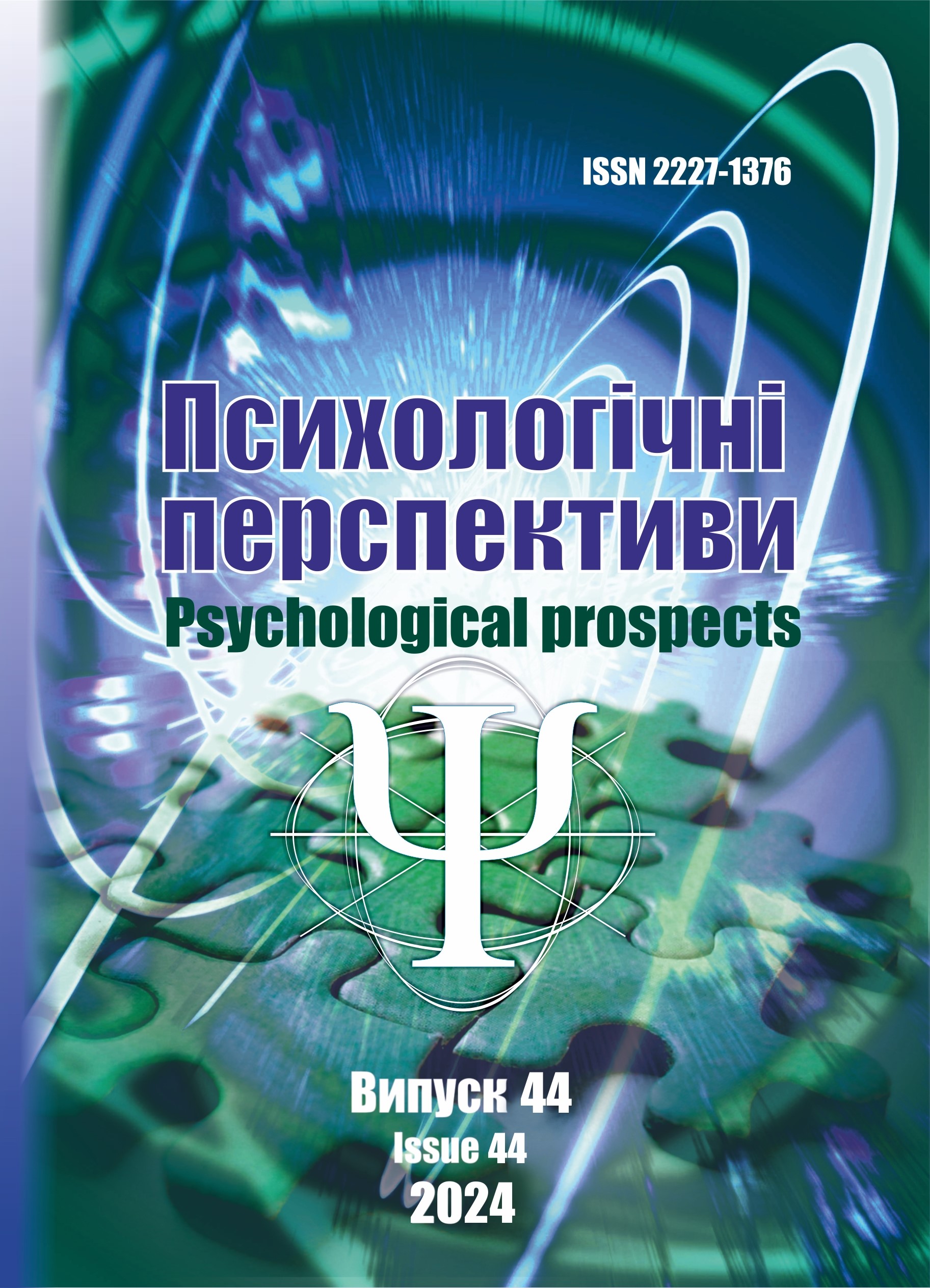Perception of occupied cities under the stress of war
DOI:
https://doi.org/10.29038/2227-1376-2024-44-khaKeywords:
stress, coping-strategy, occupied cities, “ourness” of city, perceptionAbstract
Purpose of the article is to empirically determine the peculiarities of perception of occupied cities under the stress of war.
Methods. To achieve this goal, the author's questionnaire “Characteristics of Perception of Occupied, Frequently Shelled and Relatively Safe Cities of Ukraine” was used, as well as psychodiagnostic methods aimed at determining: coping strategies by R. Lazarus; stress level by V. Shcherbatykh; anxiety by C. Spielberger. The methods of statistical data processing were correlation and comparative analysis.
The group of respondents consisted of 148 citizens of Ukraine (23 men, 125 women) aged 14 to 57 years, who at the time of the study (in 2023) were in 19 different regions of Ukraine and in European countries.
Results. The respondents showed a high degree of stress and confrontation coping strategy, as well as its connection with the subjective experience of the value of cities, their emotional significance and “ourness”. The subjective value of the occupied cities is interconnected with the attribution of suffering to their inhabitants, the tragic nature of events in them, and their perceptual value. Gender differences have been identified: women attribute a relatively higher level of “ourness”, emotional significance and value to all Ukrainian cities than men. Women are characterized by a higher level of tragedy in the perception of all the cities assessed; they are more likely to use such coping strategies as distancing, escape, seeking social support, and positive reassessment than men. Differences in stress levels were also found: this level is paradoxically lower among residents of regions closer to the front line than among residents of western regions and people abroad. Residents of the western regions of Ukraine have a lower level of attributed “belongingness” to occupied and de-occupied cities.
Conclusions. Experiencing the stress of war and the confrontation coping strategy actualized by it are related to the peculiarities of perception of the occupied cities. They are perceived as tragic, subjectively valuable, and spatially larger. Women ascribe a higher level of “ourness” and emotional significance to all Ukrainian cities and at the same time show a greater variety of coping strategies than men. Residents of the regions close to the front line have lower overall levels of stress and its physical signs than Ukrainian citizens from the western regions and European countries. Residents of the western regions of Ukraine have a lower level of attributed “belongingness” to both occupied and de-occupied cities.
References
1. Voitenko, O.V., Tkachuk, T.L. (2017). Psykholohichni naslidky boiovoho stresu u viiskovosluzhbovtsiv [Psychological consequences of combat stress in military personnel]. Likarska sprava – Medical Affairs, 7,141-146. [in Ukrainian]. DOI: https://doi.org/10.31640/LS-2017(7)27
2. Hnatko, O.-K. M. (2023). Osobystisni predyktory spryimannia okupovanykh mist v umovakh viiny [Personal predictors of perception of occupied cities in wartime]. Bachelor's thesis in psychology. Lviv: LNU im. Franka. [in Ukrainian].
3. Hrabovska, S., Yesyp, M. (2010). Problema kopinhu v suchasnykh psykholohichnykh doslidzhenniakh [The problem of coping in modern psychological research]. Psykholohiia osoby i suspilstva – Psychology of the individual and society, 4, 188-199. [in Ukrainian].
4. Danyliak, O., Marynets, S.-A., Zaiachkovska, O. (2016). Evoliutsiia znan pro stres: vid Hansa Selie do suchasnykh dosiahnen [Evolution of knowledge about stress: from Hans Selye to modern achievements]. Medical sciences, 15, 27-40. http://dx.doi.org/10.25040/ntsh2016.01.027 [in Ukrainian]. DOI: https://doi.org/10.25040/ntsh2016.01.027
5. Kuzikova, S. B., Zlyvkov, V. L., Lukomska, S. O. (2022). Vikovi osoblyvosti perezhyvannia travm viiny: intehratyvnyi pidkhid [Age-related features of experiencing war trauma: an integrative approach]. Naukovyi visnyk Khersonskoho derzhavnoho universytetu. Seriia «Psykholohichni nauky» – Scientific Bulletin of Kherson State University. Psychological Sciences Series, 2, 64-70. http://dx.doi.org/10.32999/ksu2312-3206/2022-2-9 [in Ukrainian]. DOI: https://doi.org/10.32999/ksu2312-3206/2022-2-9
6. Berzonsky, M. D., (1992). Identity style and coping strategies. Journal of personality, 60(4), 771-788. DOI: https://doi.org/10.1111/j.1467-6494.1992.tb00273.x
7. Długosz, P. (2023). War trauma and strategies for coping with stress among Ukrainian refugees staying in Poland. Journal of migration and health, 8, 100-116. http://dx.doi.org/10.31234/osf.io/azy2v DOI: https://doi.org/10.1016/j.jmh.2023.100196
8. Fiske, S. T. (1993). Social cognition and social perception. Annual review of psychology, 44(1), 155-194. DOI: https://doi.org/10.1146/annurev.psych.44.1.155
9. Johnson, R. J., Antonaccio, O., Botchkovar, E., & Hobfoll, S. E. (2022). War trauma and PTSD in Ukraine’s civilian population: comparing urban-dwelling to internally displaced persons. Social psychiatry and psychiatric epidemiology, 1-10. http://dx.doi.org/10.1007/s00127-021-02176-9 DOI: https://doi.org/10.1007/s00127-021-02176-9
10. Lazarus RS. (1986). Coping Strategies. En: McHugh S, Vallis TM (eds.). Illness behavior. A multidisciplinary model. (pp. 303-308). New York: Plenum Press. DOI: https://doi.org/10.1007/978-1-4684-5257-0_21
11. Lim, I. C. Z., Tam, W. W., Chudzicka-Czupała, A., McIntyre, R. S., Teopiz, K. M., Ho, R. C., & Ho, C. S. (2022). Prevalence of depression, anxiety and post-traumatic stress in war-and conflict-afflicted areas: A meta-analysis. Frontiers in psychiatry, 13, 978703. http://dx.doi.org/10.3389/fpsyt.2022.978703 DOI: https://doi.org/10.3389/fpsyt.2022.978703
12. Lewicka, M. (2004). Identyfikacja z miejscem zamieszkania mieszkańców Warszawy: determinanty i konsekwencje. W: J. Grzelak, T. Zarycki (red.), Społeczna mapa Warszawy. Interdyscyplinarne studium metropolii warszawskiej (s. 273–315). Warszawa: Wydawnictwo Naukowe Scholar. [in Poland].
13. Lewicka, M. (2012). Psychologia miejsca. – Warszawa: Wydawnictwo naukowe SCHOLAR. [in Poland].
14. McCann, W. H. (1941). Nostalgia: A review of the literature. Psychological Bulletin, 38, 165–182. DOI: https://doi.org/10.1037/h0057354
15. Niedenthal, P. M., Barsalou, L. W., Winkielman, P., Krauth-Gruber, S., Ric, F. (2005). Embodiment in attitudes, social perception, and emotion. Personality and social psychology review, 9(3), 184-211. DOI: https://doi.org/10.1207/s15327957pspr0903_1
16. Fink, G. (Eds.). (2010). Stress of War, Conflict and Disaster. Elsevier.
17. Wechsler, B. (1995). Coping and coping strategies: a behavioural view. Applied Animal Behaviour Science, 43(2), 123-134. DOI: https://doi.org/10.1016/0168-1591(95)00557-9
18. Zebrowitz, L. A. (1990). Social perception. Thomson Brooks: Cole Publishing Co.
Downloads
Published
Issue
Section
License
Copyright (c) 2024 Nihora Khazratova, Oryslava-Kamila Gnatko, Alla Olijnyk

This work is licensed under a Creative Commons Attribution-NonCommercial 4.0 International License.






